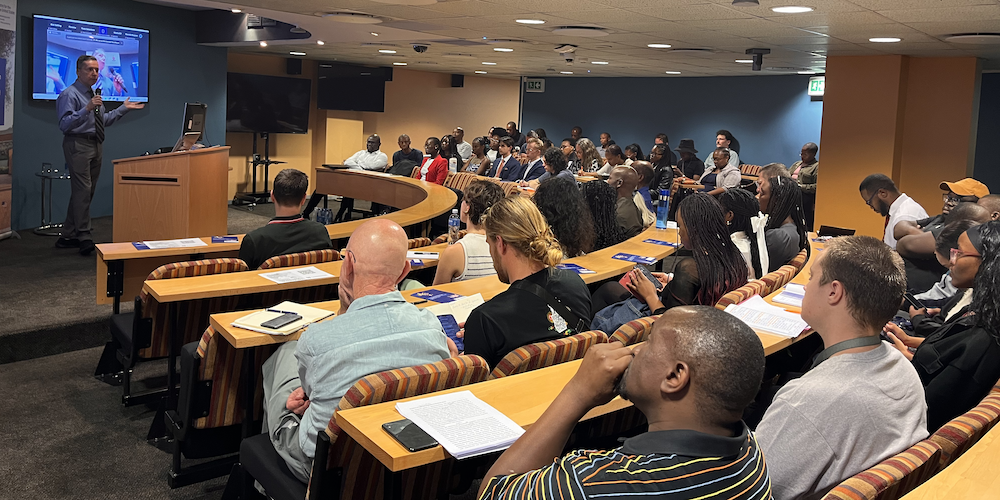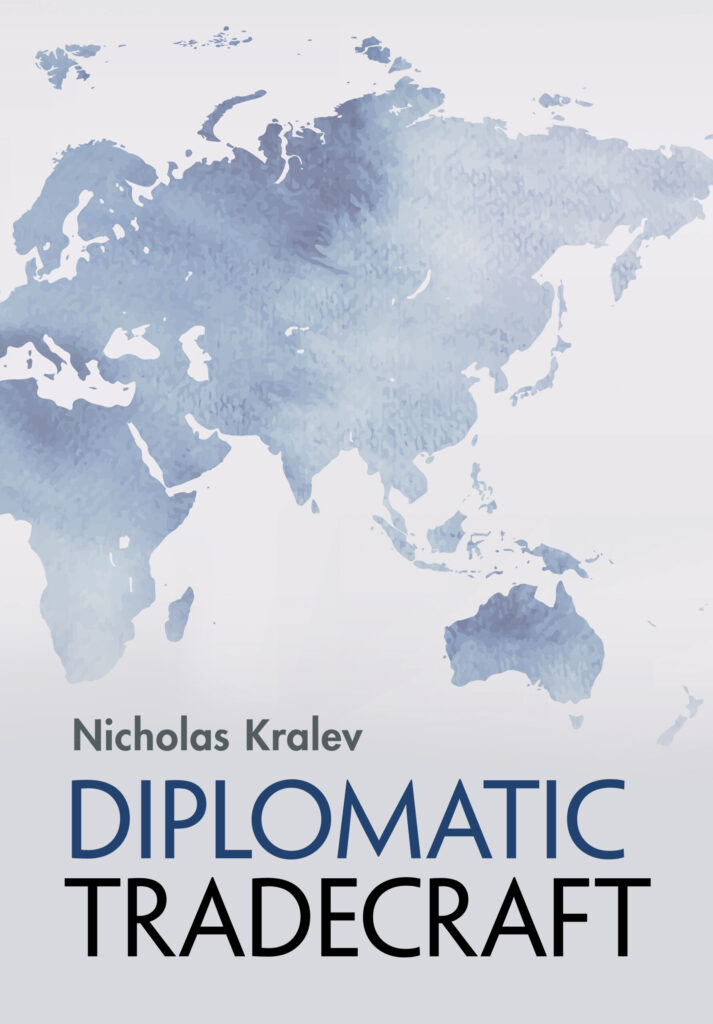Diplomacy's Hallmark: ‘Patient Accumulation of Partial Successes’
A country’s diplomatic service is the steward of its national interests abroad, but few outsiders know what happens in an embassy.
By NICHOLAS KRALEV | JUNE 2, 2024

Janice Jacobs was almost as petrified as the woman she was trying to help escape from an abusive marriage. It was 1981, and the women, both in their mid-30s, stood in front of an immigration officer at the airport in Lagos, Nigeria, their hearts racing. The woman next to Jacobs, a fellow American, had sought assistance from the U.S. Embassy after her Nigerian husband, who had repeatedly beaten and tormented her, took away her passport to prevent her from leaving the country. The embassy issued her a new passport and tasked Jacobs, a consular officer on her first tour in the U.S. Foreign Service, with ensuring that the woman flew out of Nigeria, as she wished.

The abusive husband, however, was a high-ranking official in the Nigerian Immigration Service and had instructed the officer at the airport not to let his wife through. It took Jacobs all the persuasive power, stamina and persistence she could muster, but they finally made it to the gate. Their relief turned out to be short-lived. The husband was standing menacingly in the gate area, and airport security officers, several times bigger than the petite Jacobs, blocked the woman’s way as she tried to board her plane. Jacobs, despite her delicate frame, outmaneuvered the burly men and hurried her charge onto the aircraft. The woman was soon on her way to the United States, and Jacobs happily reported to the embassy that the job was done.
In 1996, in another West African country, Sierra Leone, another American diplomat worked to resolve an even bigger problem. It was Election Day, which the officer, Charles Ray, viewed as a personal victory of sorts. For years, along with other Western diplomats, he had pressured the country’s ruling military junta to allow multi-party elections. When it finally did, Ray and his embassy colleagues helped to bring in American observers as part of an international monitoring mission. Some of them were sent to parts of the country on the frontlines of a civil war between the junta and rebels from the Revolutionary United Front. In the runup to the election, there were reports that the rebels had cut off several villagers’ hands to prevent them from voting.
On the day before the election, in a provincial capital surrounded by rebel-held territory, a pro-government militia known as the Hunters captured a rebel and dragged him in front of the hotel where U.S. observers were staying. Then the Hunters beheaded him in public view. Not surprisingly, the Americans were shocked and terrified. It fell on Ray to calm them down and ensure their safety, so he put his wide network of local contacts to work. The defense minister explained that the decapitation was proof that the Hunters were protecting the Americans, and they had nothing to worry about. The election proceeded without incident, and the observers left the following day. But the civil war, marked by rape, mutilation and murder on both sides, would rage on for more than five years.
In 2003, on another continent, another U.S. diplomat coped with a very different crisis. When Lisa Kubiske arrived in the Dominican Republic, she found an economy in freefall. A popular Caribbean tourist destination, the country had been a bright spot in an unstable region until recently, in spite of poverty, corruption and weak institutions.
However, months before Kubiske began her tour at the U.S. Embassy, the third-largest Dominican bank, Banco Intercontinental, collapsed. Investigators discovered that it had kept two sets of books for more than a decade, covering up massive bad loans and lavish spending. The crisis widened to include other banks and led to the first economic contraction since 1990, and to soaring inflation and unemployment. The number of Dominicans fleeing to the United States and intercepted by the U.S. Coast Guard jumped more than 20 times compared to two years earlier.
The economic crisis significantly complicated Washington’s plans to include the Dominican Republic in a Central America free trade agreement it hoped to negotiate. It believed such a pact would benefit both U.S. businesses and consumers. Kubiske and her embassy colleagues helped clear the way for a negotiation by helping the Dominican government claw its way back from the abyss.
In 2014, another U.S. diplomat criss-crossed Europe to conduct another kind of negotiation. Not long after Russia annexed Ukraine’s Crimean Peninsula and invaded the country’s eastern Donbas region, Washington started working on the first-ever broad set of sanctions against Moscow. It preferred to enact such penalties in concert with the European Union (EU). So the White House dispatched Daniel Fried, along with officials from the Department of the Treasury and other agencies, to EU member-states to negotiate an agreement.
These stories from the experiences of four of the contributors to “Diplomatic Tradecraft,” the first-ever practical diplomacy textbook, provide a rare glimpse into some of what diplomats do, though they represent a very small part of the duties and responsibilities of the career Foreign Service. Each of the book’s chapters adds to the diverse elements of modern diplomatic practice and lifts the curtain on various aspects of a unique type of tradecraft and profession. Diplomacy seldom produces quick results, and its victories are rarely celebrated. A diplomatic win is much more often “the patient accumulation of partial successes,” in Henry Kissinger’s words.
A country’s diplomatic service is — or at least should be — the steward of its national interests abroad. International civil servants, who work on the staff of multilateral organizations like the United Nations and the EU, are supposed to serve global or regional interests. Both bilateral and multilateral diplomats manage and participate in the daily conduct of international relations. In carrying out their duties, they work within a diplomacy architecture — systems that have been established at the national and global levels.
What type of people make good diplomats? Naturally, they have to be globally aware, but they also must be deeply connected to the country they represent. They must have empathy for the views of others in order to understand their thinking. They have to be able to operate in foreign societies and flourish in different cultures, so they should enjoy living abroad and moving around every few years. They must possess a high level of curiosity and revel in learning new things. They must be good at listening and talking to people, and they must be able to set aside their own politics and personal policy views and serve whatever government is in power.
Diplomats are expected to perform most, if not all, of the sets of duties and responsibilities listed above during their careers — and often at the same time. One may have to engage in representation, relationship management, reporting and analysis, and advocacy and influence in the same week. What about expertise? In much of the world, a career diplomat is a Jack of all trades or, officially, a generalist, doing jobs as different as repatriating a deceased compatriot’s remains, reporting on anti-government protests in the host-country and trying to increase trade and investment. Even if a Foreign Service officer has formally chosen an economic career track, they may end up in a public diplomacy or operational management job — either because they were encouraged to be versatile to get promoted faster, or because an economic job was not available in the country or region where the officer wanted to serve during that particular tour.
Diplomats from some countries, such as China and Russia, are regional experts and work in the same geographic region during their entire careers. Foreign Service officers from the United States and other Western countries do not have a formal specialization and move between regions. Many officers naturally develop expertise in a certain area, but they nonetheless take assignments outside of it. The average U.S. diplomat spends most of their career on two continents, in addition to serving in Washington.
Nicholas Kralev, the executive director of the Washington International Diplomatic Academy, is the author of “America’s Other Army: The U.S. Foreign Service and 21st-Century Diplomacy” and co-author and editor of “Diplomatic Tradecraft.”
The above is an adapted excerpt from the book, published with permission from Cambridge University Press. “Diplomatic Tradecraft” © Nicholas Kralev 2024

